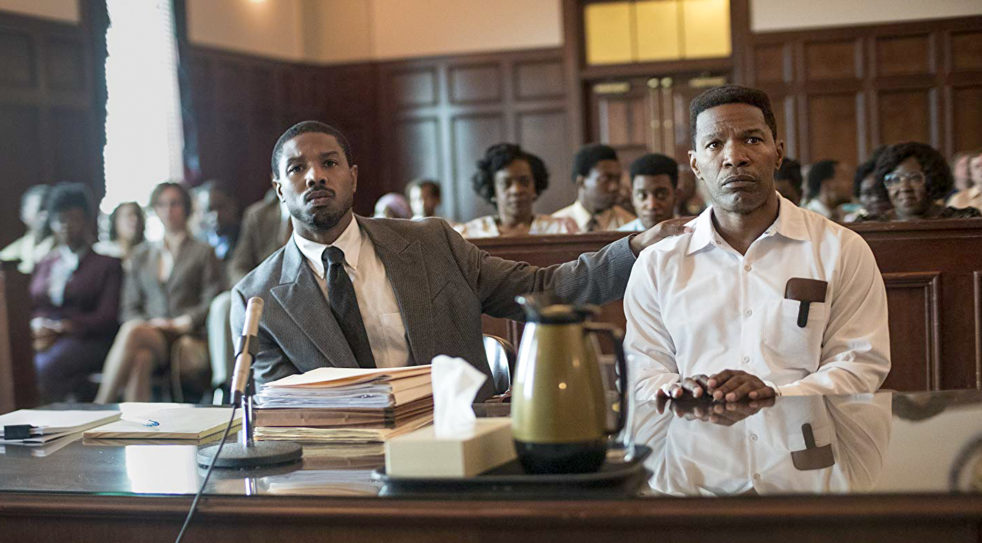To be truthful, it is hard to remain impartial about “Just Mercy.” Although the film often teeters too far into melodrama, the deep well of empathy on display simply proves too much to resist.
Writer-director Destin Daniel Cretton is no stranger to injustice or to compassionate filmmaking. His acclaimed indie movie “Short Term 12” oozes with care, gazing lovingly at a rehabilitative treatment facility for abused and addicted youths. In this regard, he proves the perfect fit for “Just Mercy.”
Adapted from defense attorney Bryan Stevenson’s memoir of the same title, the new criminal justice drama, co-written by Andrew Lanham (“The Glass Castle”), details the real case of Walter McMillian — an African American man who was wrongfully convicted of murder and sentenced to death. Opposite McMillian is a young, Harvard-educated attorney, Bryan Stevenson (Michael B. Jordan, “Black Panther”). The lawyer, who is now known publicly as the founder of the Equal Justice Initiative, moved to Alabama to defend inmates on death row. Here, he meets McMillian (Jamie Foxx, “Django Unchained”).
Unsurprisingly, Stevenson’s investigation uncovers glaring holes, inconsistencies and racism in the case. An African American, himself, his efforts are met with racism, threats and intimidation from Alabama’s law enforcement. With the assistance and guidance of local ally Eva Ansley (Brie Larson, “Captain Marvel”) and McMillian’s family, the team begins to strengthen their defense.
But the film’s world is fuller than simply the details of McMillian’s case. Inmates labor and toil in fields, evoking the region’s history of slavery and exploitation. References to “To Kill A Mockingbird” call to mind the injustice of the novel’s similar case.
While law enforcement officials spout half-truisms about protecting the public, Stevenson quickly highlights how often that excludes the African American community, who are made to feel quite unsafe by these same efforts. Past and present are tied together; literature blends into reality. The depth bolsters “Just Mercy’s” illustration of pervasive, institutional racism.
Unlike other movies, though, Cretton’s drama does not throw its hands up in surrender. It lays the groundwork to portray an unjust world and then provides a solution: empathy.
Stevenson sits with several inmates, making efforts to connect with each. He not only asks them about their cases but also about their childhoods and their experiences. Beyond that — he connects — he smiles and he laughs. They ask him to join in prayer and even to sit beside them as they await the electric chair, and
Stevenson obliges.
The film presents compelling arguments against the death penalty and in favor of a more just, equitable legal system. Some of the convicts portrayed admit their guilt and repent while others, like McMillian, were falsely accused and pressured into a no-win situation. Either way, the reality is that it is difficult to look these men in the eyes and feel anything less than sympathy.
As a social justice movie, however, the movie is deeply imperfect. The courtroom scenes are heavily dramatized, making yet another movie that fails to accurately represent legal proceedings. Characters often talk directly to the camera. The resultant feeling is that the movie unnecessarily preaches when the literal reality of the case should speak for itself.
In spite of this, it is hard to be unmoved by “Just Mercy,” especially when so much of the film reflects such a stark reality. Stevenson and McMillian’s true story occurs time and again in today’s criminal justice system. The question the movie raises is not about whether this happens in the real world — it does. “Just Mercy” is more concerned with pushing viewers and civil servants to consider what their place is in relation to this injustice.
Bryan Stevenson undoubtedly had a life-altering impact on the clients and communities he served. Most Americans may never meet or be aware of the work done by the Bryan Stevensons among them — and boy, there are plenty — but they should see “Just Mercy” and change how they view race, criminal justice and the death penalty.
